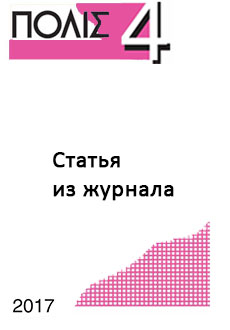Online shop of "Polis. Political Studies" Journal
We in the world, the world in us
Gudalov N.N. National Identities and International Relations Redux, or Is It Necessary to ‘Reinvent’ Constructivism? – Polis. Political Studies. 2017. No 4. P. 165-174 (In Russ.) .
Free!
international relations theory; constructivism; poststructuralism; postcolonial theory; identity; difference; interest; political practice
Identity is a prime subject of inquiry for constructivism in international relations theory; it has attracted the longstanding attention of other approaches. The monograph National Identities and International Relations (2016) by Richard Ned Lebow, a prominent international relations scholar, has been one of the most important recent attempts to introduce fundamental innovations in constructivism. This article is aimed at further theoretical reflection on identity through analyzing some controversial aspects in Lebow’s approach and relating them with existing academic viewpoints. Lebow’s ideas are criticized in this article primarily from within the constructivist methodology itself. Four series of problems are considered successively. The first relates to the general understanding of identity. It is shown that the plurality and changeability of identities stressed by Lebow have long been acknowledged in constructivism. The second emerges from the comparison between the identities of states and individuals. Lebow ignores the arguments supporting the possible existence at the state level of such group phenomena as emotions, cognition and consciousness not reducible to the level of their citizens. The article also suggests paying more attention than Lebow does to the gender dimension of states and to the fact that individual and state identities may in principle be equally plural. The third is connected to the sources of identity and to the relation between actors and society. Lebow oscillates between individualist and holistic views. His emphasis on the dialectic nature of identity formation is not novel. At the same time, Lebow obscures the sociality of some aspects of identity. The fourth concerns the mutual influence of identities, interests and practice. On the whole, Lebow underestimates the influence of identities on practice and interests. It is concluded that some of the solutions suggested by Lebow are controversial or not sufficiently novel, though his approach draws attention to important problems of constructivism which require detailed elaboration.
 English
English Русский
Русский

Reviews
There are no reviews yet.